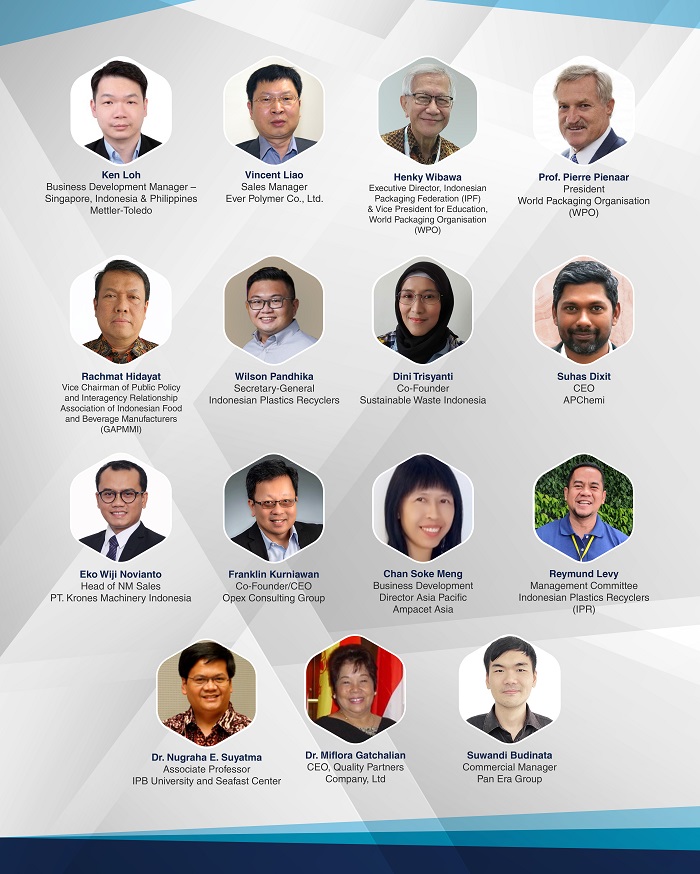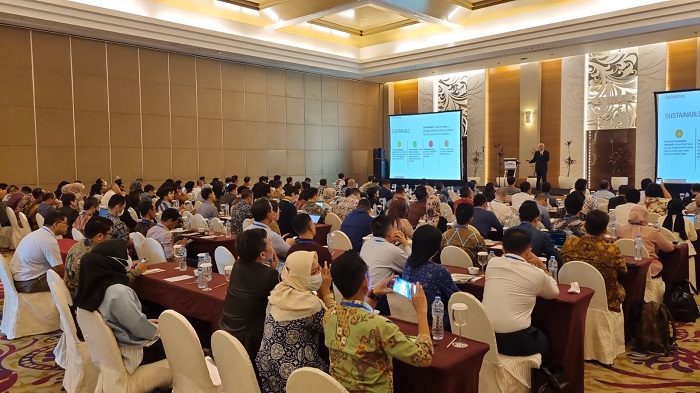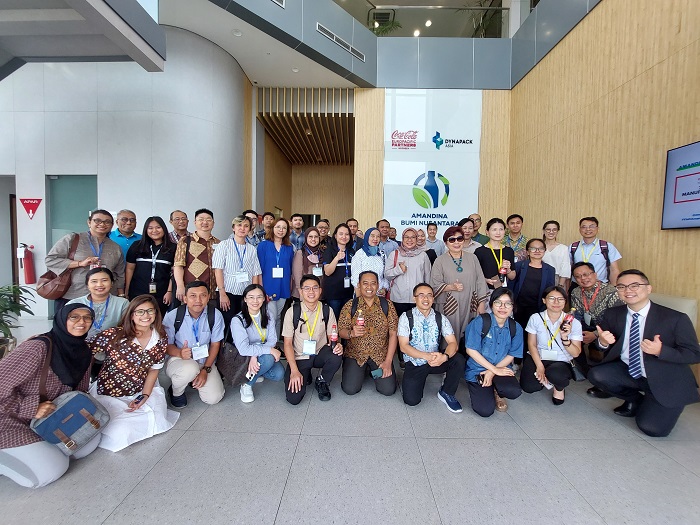Innovative technologies for Indonesia's dynamic industries
Date Published:8/1/2023 07:08:59 上午
Southeast Asia’s food and beverage industry plays a major role in providing for the needs of the global market. Despite difficulties, from rising energy and commodity prices to material shortages, the outlook remains positive for the region. Industry revenue is forecast to reach US$12.18 billion in 2023 with the number of consumers expected to reach 120.60 by 2027, according to Statista Market Forecast.
Within the region, Indonesia offers a lucrative market due to its large consumer base and presence of a dynamic industrial sector. With a population of over 277 million and having the largest economy in the region, Indonesia attracts substantial investments in the food and beverage sector and related industries, such as packaging. As the trends in food and beverage packaging have moved towards the circular economy model, recycling is becoming an integral part of the production network, along with more advanced processing technologies, automation and intelligent production systems.

These key developments in food and beverage manufacturing, packaging and recycling activities in Indonesia are among the highlights of the presentations and discussions during the “2023 ASEAN Manufacturing Summit: Food & Beverage Processing Technology & Automation, Sustainable Packaging and Recycling Technology” held on 12-13 July at JS Luwansa Hotel in Jakarta. Attended by more than 160 delegates, the Summit gathered the industry professionals who listened to information-packed presentations of Indonesia-based and foreign speakers as they shared notable market trends, innovations to boost food & beverage production, the transition towards smart packaging and implementation of efficient recycling.
This first post-pandemic conference by Ringier Events in Indonesia was supported by business partners Mettler-Toledo, Ever Polymer Co.,Ltd., Guangzhou Expresspacks Equipment Co., Ltd., elinpack Packaging Machinery Co., Ltd., Smart Weigh Packaging Machinery Co., Ltd., Guangzhou Tyrone Environmental Technology Co., Ltd., Foshan BJY Precise Technology Co., Ltd., Dongguan Keerham Machinery Co., Ltd., and Dongguan Fulu Chemical Co., Ltd. Major industry associations gave their support and these include the Association of Indonesian Food and Beverage Manufacturers (GAPMMI), leading association for the food and beverage industry; the Indonesian Packaging Federation (IPF), a major association representing the packaging manufacturers; and Indonesian Plastics Recyclers (IPR), which represents Indonesia’s recycling sector.
Information-packed first day of the Summit
Highlights of the first day of the Summit include the opening remarks by Mike Hay, President and CEO, of Ringier Trade Media Ltd. The keynote speech of Prof. Pierre Pienaar on the circular economy for plastics in food packaging stressed on the role of plastics in food packaging and the need to strike a balance between sustainability in packaging and food to protect our planet. He also mentioned the role of the World Packaging Organisation (WPO) in helping the industry see a future without waste and in helping countries achieve sustainability by supporting the design and implementation of affordable and effective mandatory Extended Producer Responsibility Schemes.
The presentation of Indonesian Packaging Federation Executive Director Henky Wibawa, was well-received by the audience. An expert in the packaging industry and sought-after for his views, Mr. Wibawa, who also serves as the Vice President for Education of the World Packaging Organisation, discussed how to achieve smart manufacturing towards a circular ecosystem. Citing the top trends affecting the packaging market in every region of the world and consumer preferences, his presentation covered key aspects and requisites towards sustainable packaging and how smart manufacturing technologies can drive growth in this field. The Vice Chairman of Public Policy and Interagency Relationship Association of Indonesian Food and Beverage Manufacturers (GAPMMI), Rachmat Hidayat, talked about Indonesia’s food and beverage industry trends and directions. His discussion centered on the contributions of the F&B industry in the economy, as well as the opportunities and challenges in the Indonesian F&B market. Specifically, he pointed out the importance of the halal market, its growth potential and the regulatory framework.

Digitalization and what it means for Indonesia’s F&B manufacturing was the topic presented by Franklin Kurniawan, CEO and Co-Founder of Opex Consulting Group. Mr. Kurniawan pointed out the benefits of digitalization as well as the common challenges in digital transformation. He also provided useful guide on how to start the digital transformation journey. The presentation of Ever Polymer Co., Ltd. (Everlon) Sales Manager Vincent Liao focused on the new breed of thermoplastic materials ideal for the food packaging and even for pharmaceutical products. His presentation centered on how Everlon has successfully designed materials that are meeting the stringent requirements of these industries. Ms. Dini Trisyanti, Co-Founder of Sustainable Waste Indonesia presented on the circular economy development trends and regulations in Indonesia. Ms. Trisyanti talked about Sustainable Waste Indonesia (SWI) or PT. Sendang Bumi Wastama and its program. SWI is an Indonesian consultancy company dedicated to bridge the global waste management today with Indonesia challenge and context as well as to promote local / indigenous knowledge and best practice. Her presentation showed the various programs undertaken by SWI with regards to recyclable collection system and trends in recycled products.
Dedicated sessions on F&B manufacturing and packaging
The afternoon sessions were divided into two: one on F&B processing and another on packaging and recycling. Under the F&B session, Mettler-Toledo representative, Ken Loh, the Business Development Manager for Singapore, Indonesia & Philippines, discussed the measure to prevent contamination and uphold safety, as well as the need for due diligence in food production. With over 23 years’ experience in Industry Automation, Mr. Loh’s role at Mettler Toledo includes helping manufacturers to efficiently realise their food safety programmes through advanced product inspection technologies.
The presentation of the head of NM Sales at Pt. Krones Machinery Indonesia Eko Wiji Novianto placed emphasis on the adoption of cost-efficient automation strategy through the latest technologies and smart machines. Mr. Novianto gave an overview of Krones machines and how these can benefit the F&B manufacturers in Indonesia. Krones offers a whole range of technologies covering the crucial steps in the production process. One example is the ErgoBloc LM which is designed as a holistic system with one central unit each for the control system, the drive and the operation. A virtual presentation by Dr. Miflora Gatchalian, CEO of Quality Partners in the Philippines discussed how quality, productivity and profitability can be achieved in food product development through a total quality management system known as SUGOD-TQM.
The packaging session was attended by leading Indonesian companies engaged in packaging production as well as those involved in recycling. Representing the Management Committee of the Indonesian Plastics Recyclers (IPR), Reymond Levy talked about the plastic recycling landscape in Indonesia and how the IPR has been promoting sustainable recycling through its various programs and activities. The case study of a plastics recycler, Pan Era Group, was presented by the Group’s Commercial Manager, Suwandi Budinata. Pan Era Group is an Indonesian organization with strong background in plastic recycling and focus on implementing the highest standard in quality and environmental management system. Established in 1987 as a plastic waste crusher and trader, Pan Era has evolved into one of the largest polyethylene recyclers in Southeast Asia with plans to expand its production capacity and market reach. New additives and their impact on sustainable packaging was the topic of the virtual presentation by the Business Development Director Asia Pacific of AMPACET, Chan Soke Meng. Ms. Chan was also online to answer questions from the audience.
Highlights of the second day
The second day of the Summit brought several highlights. The first presentation by Dr. Nugraha E. Suyatma, Associate Professor of IPB University and Seafast Center focused on active and intelligent packaging to increase the safety and storage life of food. Dr. Suyatma talked about the developments in active and intelligent packaging as applied in food packaging. He also covered labeling and how these adhere to current regulations. The second presentation was virtually delivered by the CEO of APChemi, Suhas Dixit, where he discussed the advantages of chemical recycling through pyrolysis for more efficient and sustainable recycling. From India, Mr. Dixit answered the questions of the audience.
The Panel Discussion capped the session of the two-day summit. With panelists that included Mr. Henky Wibawa of the Indonesian Packaging Federation and World Packaging Organisation, Mr. Franklin Kurniawan of Opex Consulting Group and Mr. Wilson Pandhika of the Indonesian Plastics Recyclers, the audience listened to their insights on relevant questions. The questions covered such issues as transitioning towards digitalization, how to achieve smart manufacturing given cost constraints and what regulations or measures are needed to encourage recycling. The panelists also answered additional questions posed by the delegates.

Factory Visit to a state-of-the-art PET recycling plant
One of the highlights of the Summit is the Factory Visit to the Pt Amandina Bumi Nusantara, which was arranged in coordination with Dynapack Asia. Coca-Cola Europacific Partners Indonesia and Dynapack Asia jointly established the highly advanced bottle-to-bottle grade PET recycling in Indonesia that aims to create a close-loop cycle for plastic packaging.
The state-of-the-art rPET facility transforms PET waste back to virgin-quality, food-grade PET using the latest renewable technology. The informative orientation and guided tour of the facility also included an introduction on the Mahija Parahita Nusantara Foundation, an initiative that aims to help improve quantity and quality of the plastic waste collection and ensure a reliable and ethical feedstock source.

